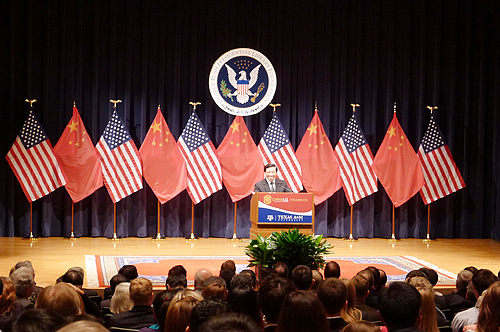|
 |
|
KEYNOTE SPEECH: Chinese Ambassador to the United States Zhang Yesui delivers a keynote speech at the opening of the 2011 China-U.S. Relations Conference held at Texas A&M University on October 23 (CHEN WEN) |
China and the United States should continue to build strategic trust and properly handle differences and disagreements, said Chinese Ambassador to the United States Zhang Yesui at a high-level conference on bilateral relations.
"China and the United States are different in political system, social value, historic and cultural traditions," which can "lead to misunderstanding and mistrust in each other's strategic intentions," Zhang said, addressing the opening ceremony of the 2011 China-U.S. Relations Conference held at Texas A&M University on October 23.
There has been recent tension in the relations between the two largest economies of the world. The United States announced last month that it would sell $5.85 billion in military hardware to Taiwan. A few weeks later, the U.S. Senate passed a controversial bill aimed at forcing China to raise the value of yuan to save American jobs. Both provoked strong opposition from China.
The question of Taiwan is "critically related to China's security and territorial integrity," Zhang said, urging the U.S. to respect China's concerns and honor the three Sino-U.S. joint communiqués.
For the currency issue, Zhang noted that the appreciation of yuan will not significantly help to lower the unemployment rate in the United States, but China's direct investment in the U.S. will help to create jobs in the country.
"Both governments have realized the importance of encouraging Chinese investment in the U.S," Zhang said, adding that he expected more Chinese direct investment will come to the United States.
Zhang said that the two countries have been closely interconnected and shared common interests on a broad range of issues. "It is imperative to shift from the old habitual way of thinking and begin to frame China-U.S. relations with a global view and from a strategic and long-term perspective," he said. "If we work together as partners, we would both emerge as winners," Zhang added.
The two-day forum on promoting relations between China and the United States is the fifth in the series beginning in 2003. It was co-hosted by the Chinese People's Association for Friendship with Foreign Countries, Texas A&M University and its George Bush School of Government and Public Service and the George Bush Presidential Library Foundation.
About 600 delegates attended the conference, including officials, businesses and academic leaders from both countries.
Under the theme of "Institutionalizing Collaborative Research and Partnership," this year's event is an "important platform" to seek understanding and "explore issues of common interest" between the two countries, said Bowen Loftin, President of Texas A&M University.
(Reporting from College Station, Texas) | 